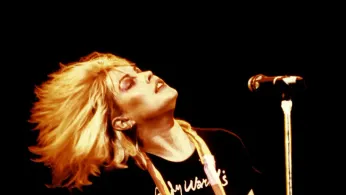
4 hours ago
Debbie Harry Endorses Florence Pugh to Play Her in Upcoming Blondie Biopic
READ TIME: 4 MIN.
Debbie Harry, the trailblazing lead singer of Blondie, has made headlines by revealing her top choice to play her in a forthcoming biopic about the iconic band: Florence Pugh. In a recent interview with The Times, Harry stated, “If it were somebody like Florence Pugh, I would be in heaven. I just think she’s a great actor, and she could do anything” . This endorsement has quickly gained attention across media platforms, as two films about Blondie—one a documentary, the other a biographical drama—are in development, aiming to chronicle the band’s rise during the 1970s and 1980s.
Florence Pugh, known for her powerful performances in films such as "Little Women" and "Midsommar", and her role in the Marvel Cinematic Universe, received an Oscar nomination for her acting and has been praised for her ability to portray complex, dynamic women . The news of Harry’s endorsement has fueled speculation and excitement within the entertainment industry about the potential for an authentic and compelling portrayal of Harry’s life and Blondie’s influence.
Debbie Harry’s influence as a pioneering woman in punk, new wave, and pop music is undeniable. As Blondie’s frontwoman, she helped break down barriers for women and LGBTQ+ people in the music industry, defying traditional gender roles and embracing a style that was unapologetically bold and individualistic . Songs such as “Call Me” and “The Tide Is High” became anthems of the era, and Blondie’s genre-blending sound—mixing rock, reggae, and disco—was revolutionary at the time.
Harry’s journey has included moments of both triumph and regret. She famously turned down the role of Pris in Ridley Scott’s *Blade Runner*—a decision she later called her “biggest regret”—due to her record label’s concerns about her taking time off from music . In addition to her music career, Harry has dabbled in acting, appearing in cult classics like David Cronenberg’s *Videodrome* and the Martin Scorsese-directed segment of *New York Stories*.
Harry, who recently celebrated her 80th birthday, remains active in music and culture. She continues to perform and reflects candidly on the process of aging, stating, “Sometimes when I walk out on stage and there’s such a terrific response, I feel like I’d better stop while I’m ahead. But no, it’s still joyful” . Her reflections on aging, resilience, and creativity continue to inspire both long-time fans and new generations.
Florence Pugh’s reputation for portraying strong, nuanced characters has made her a standout in contemporary cinema. In a 2020 interview at the Santa Barbara International Film Festival, Pugh herself expressed admiration for Harry and revealed her interest in playing the singer in a biopic, stating Blondie was “so cool” . This mutual admiration between Harry and Pugh underscores the potential for a meaningful and transformative film.
Pugh’s casting would carry significant cultural resonance, particularly for LGBTQ+ audiences and communities that have long identified with Blondie’s message of self-expression and nonconformity. Harry’s outspoken support for LGBTQ+ rights and her willingness to challenge industry norms have made her a beloved figure within queer communities worldwide. A biopic that authentically captures these aspects of her life and career would contribute to broader conversations about visibility, representation, and the celebration of LGBTQ+ icons in mainstream media .
Blondie’s influence extends far beyond music charts; the band has been credited with helping to shape the cultural landscape for marginalized communities, including LGBTQ+ people. Harry’s androgynous fashion, outspoken personality, and the band’s embrace of diverse musical influences created a space where queer fans felt seen and celebrated. Blondie’s performances at LGBTQ+ venues and events throughout the 1970s and 1980s further cemented their legacy as cultural trailblazers .
The biopic’s development comes at a time when the entertainment industry is increasingly prioritizing authentic representation, both on-screen and behind the scenes. Casting decisions like Harry’s endorsement of Pugh signal a commitment to honoring the complexity and diversity of real-life stories. As more biopics center on LGBTQ+ figures and their allies, these films play a critical role in educating audiences and celebrating the contributions of those who have shaped music, art, and activism.
While details about the biopic’s production timeline and creative team remain under wraps, the project has already sparked anticipation among fans and cultural commentators. The prospect of Florence Pugh portraying Debbie Harry offers an opportunity to revisit Blondie’s legacy with fresh eyes, introducing new audiences to the band’s genre-defying music and Harry’s lasting impact as an artist and advocate.
As Harry herself reflects on her career and the meaning of aging, she serves as a reminder that creativity and resilience know no age limit. “I don’t walk around thinking every minute, ‘Oh my God, I’m 80’,” she told The Times. “But that’s sort of how I feel.” For Harry, embracing the wisdom and freedom that come with age is part of her ongoing journey—a journey that she hopes will inspire others, especially those who have faced marginalization or exclusion, to tell their own stories with pride and authenticity .
If Florence Pugh does take on the role, the film promises not only to celebrate the enduring spirit of Blondie but also to honor the broader movement for inclusive, intersectional storytelling in media. For fans and communities who have long looked to Debbie Harry as a symbol of self-expression and resilience, her choice of Pugh is more than casting—it is an affirmation of the power of representation, artistry, and legacy.






